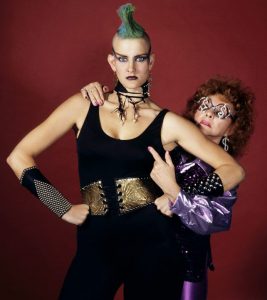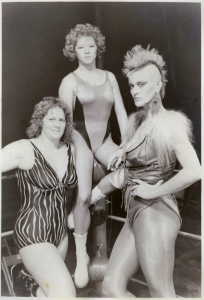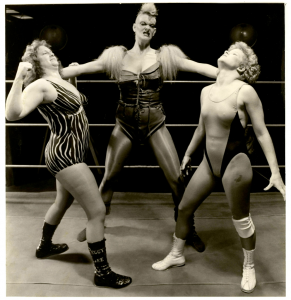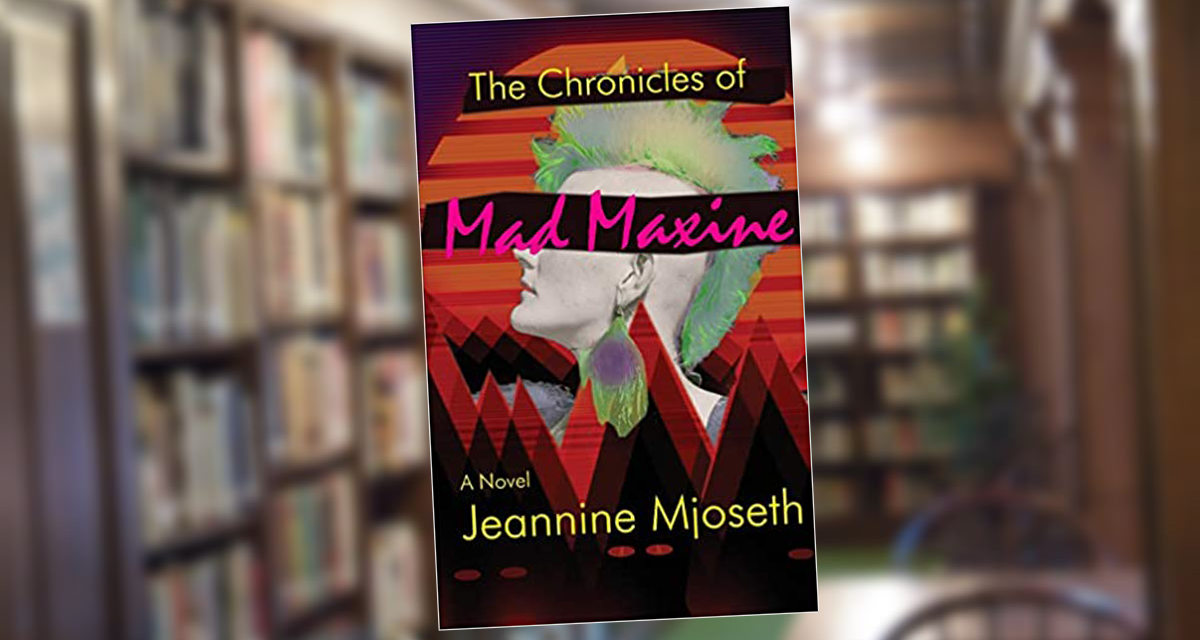“The Chronicles of Mad Maxine is about relentlessly physical young women coming into their own power. They are the heroes of their own loud wonderful lives taking up space and shouting, ‘I am!’ As they train to mimic fight scenes, they begin to realize that they call the shots in their own lives. With this newfound authority, they leave an abusive relationship and strike out on their own. But first, they must rescue a member of their tribe from an abuser in a climactic female revenge fantasy.”
The above quote is the description this reader was given by Jeannine Mjoseth about the synopsis of her first novel, The Chronicles of Mad Maxine, out now and self-published. Better known to wrestling fans as Mad Maxine, the 6-foot-2 menacing biker chic/punk with a rad mohawk, Mjoseth, through the book’s character Pippi, provides a unique, fascinating and brisk look into aspects of her unconventional life. It is a life that features Mjoseth training to be a pro wrestler for nine months with the late Fabulous Moolah (Mary Lillian Ellison) at her compound in Columbia, South Carolina, mixed with a very adventurous/dangerous undertaking as a journalist.

Jeannine Mjoseth aka Mad Maxine with the Fabulous Moolah. All photos contributed by Mjoseth.
But it must be asked, as I’m sure my fellow reading enthusiasts are also wondering this: Why a novel instead of an autobiography?
“You know, I had a hard time working on the book,” confessed the now 61-year-old Mjoseth, who currently resides in Melbourne Beach, Florida, in a phone interview with SlamWrestling.net. “For years, I really had a hard time writing it as a memoir or an autobiography because I felt queasy every time I talked about wrestling, the wrestling business. One of the things that Moolah did was she drummed into me and into all of us (the female wrestlers that she trained) was the importance of protecting the business. And so, I really had internalized kayfabe (the practice of presenting pro wrestling storylines as authentic). So, I figured I would just write a novel based on my experiences. And just like with wrestling, the readers wouldn’t know what was real and what was fiction.”
True to her word, Mjoseth does not want to discuss which parts of the book are real and which are fiction during our interview. Although she did concede to sharing that when the character of Pippi ends up covering a Ku Klux Klan rally for an African American newspaper — that event actually happened!
“Being an army brat, I was raised in a thoroughly integrated environment,” Mjoseth, who has a journalism degree from the University of South Florida, shared while recalling the rally. “Racism probably went on, but it wasn’t tolerated overtly. And so, I was raised with everyone, all in one school (of thought). I wasn’t prepared for what it (the rally) was. Just the foul language and the hatred.”
She added further, “I do think that the city of Columbia made the right decision to have it (the rally) outside of the city and in the middle of nowhere. I was actually pretty scared that they would find out that I was working for the Black News. I had a real debate with myself about whether I should put my byline on it, but then I thought if I don’t put my name on it, then it didn’t really happen. It was jarring. And the publishers of the Black News they were worried about sending an African American reporter to the scene. I’ll tell you what it was. It was risky, but like a lot of things where you take a risk, it turned out well. And it is the one thing on my resume that has gotten me more job interviews than anything else on my resume. People just want to know about it!”
The book took Mjoseth 35 years to release due to a variety of factors. There was the aforementioned “conundrum of not wanting to expose the business and not wanting to hurt anybody that I had wrested with” added to the fact that she had never published a book before, the fear faced by many writers of putting your work out there, and she had to reconstruct the journal she had been keeping during her wrestling days after it was amongst her belongings stolen from a locker room while she was in a match. After turning 60 and the onset of COVID-19, Mjoseth decided that it was now or never. “I’ve got to get this done before I die,” she recalled thinking.
Now that the book has been released into the world and even with the “entirely positive” responses Mjoseth says she has received from figures in pro wrestling, she admitted that she still has some anxiety over the project.

From (l to r): Peggy Fowler, Luna Vachon and Mjoseth. Photo credit: David Audet.
“I’ve been pretty nervous about it to be honest with you,” revealed Mjoseth, who at the same time is excited and eager to pen the book’s sequel. “I just really respect many of the women that I trained with and lived with at the camp and people in the business. I would never want them to think that I was slagging them.”
When it comes to her fellow Moolah trainees, Mjoseth has nothing but fond memories of the late Luna Vahon (Gertrude Angelle Vachon), whom she endearingly refers to as Angelle throughout our conversation. And a bit of a spoiler here but, most readers will come to the conclusion that Vachon is the basis for the character of Giselle in the novel.
“She was a really kind person,” Mjoseth said and even though we can’t see each other, I know she is smiling as she speaks. “She really was a really empathetic person. She felt what you felt and she wanted to make things better. If you were her friend, she really looked out for you. I just really regret that she died so young. It seems such a crime. I think it’s also… it’s super sad that somebody who was as talented as heel, as a wrestler, I mean she could have continued. She could have scaled it back and been a manager or some kind of color commentator. It was just so, so sad that she went so fast, I mean so soon. I just think of her as like a sweetheart. Just a really nice person. And was always kind to me.”
The book contains pseudonyms for most of the figures in pro wrestling that Mjoseth encountered. The notable exception is Moolah. “You can’t libel a dead person,” explained Mjoseth. “That’s really the reason. The libel laws don’t cover dead people.”
Mjoseth doesn’t mince words in the book nor in our interview when it comes to discussing the controversial legacy of Moolah.
“(Moolah) certainly did a lot for women,” Mjoseth pointed out. “Raising awareness, raising them up to the WWF (World Wrestling Federation, now World Wrestling Entertainment, WWE). She was an organizer. She had a group of women who were well trained. And I mean, I think she did some really good things. I don’t think you can take that away from her.”
But there was another side to Moolah too. There have been multiple allegations over the years that Moolah was opportunistic, money hungry and, to put it bluntly, a pimp.
Mjoseth shared that while she was at the training compound, Moolah offered her the opportunity to go see “a friend” of hers that would pay her to take some photos. This explanation was not exactly truthful.
“(Moolah) wanted me to go out to this guy that she provided with wrestlers,” Mjoseth recalled. “I took the phone number and I called him and I talked to him and I asked him what he’d expect for $500. And he was not explicit, but it was a skeezy enough response that I was pretty clear that it wasn’t just photographs that he would be wanting.”
She continued, “I think if grown women want to do that, great. But I don’t think somebody should be pimping anybody out. I think having an intermediary is probably not a good idea. And the women should get all the money! I think it’s kind of like sex work. And I think that women can choose to do whatever they want to do with their bodies. Great. The line that I draw is with sending underage women out there and she (Moolah) did that.”

Fowler and Vachon attempt to take on Mad Maxine. Photo credit: David Audet.
Mjoseth admitted she did take out libel insurance for her book as a precaution, but she hasn’t had any legal issues so far. She also shared that she was asked to participate in the Dark Side of the Ring episode that focused on Moolah, but wasn’t able to as she was with her husband, Steve Hilmy, who is a musician and composer, at a gig in the Ukraine at the time of filming.
“I just think that (Moolah) internalized being a heel too much,” observed Mjoseth. “I think her heel persona seeped into her real personality. Or maybe she was just like that even before, I don’t know. It’s like if you have a favorite singer and then somebody tells you, ‘Oh yeah they’re a great singer, but they’re such assholes in real life.’ So that doesn’t take away from their ability to sing these great songs or paint great paintings or whatever skill they had. But it does make you think, ‘Oh it kind of sullies the whole thing!’”
She added, “I don’t have any animosity toward her. She’s long gone and at some point, I will be long gone. So, there’s no grudge at all. And I also think it’s really kind of amazing how people get so upset about that. They feel the need to defend her. I think it’s pretty widely known that she was pretty bad in a lot of different ways. And it’s also funny to me that these guys who don’t know and don’t have firsthand knowledge, you know they didn’t train with Moolah, they just have their opinion. I don’t know, I just think it’s a little bit like that some of the people who do defend her who were in the camp, I feel there is a little Stockholm Syndrome going on. You know where you feel like this was a big part of my life and for whatever she did, she gave me my shot. I think that’s loyalty and you can’t fault somebody for loyalty.”
Mjoseth, like Pippi in the book, ends up leaving Moolah after wrestling for the WWF and being pressured to sign a contract. Mjoseth refused to sign the contract she was offered without showing it to a lawyer, who adamantly told her not to sign it.
“It was just a piece of crap,” Mjoseth shared. “They (the WWF) basically owned everything. They would have owned Mad Maxine and Lady Maxine. I would have had no right to the name and image that I developed. So that vibe was just not good.”
After leaving Moolah, Mjoseth moved down to Miami with Vachon and Peggy Fowler. Vachon’s family owned a condo there and the trio tried to get wrestling work on their own. In the book, on their way to Miami, the ladies go to rescue an underage fellow Moolah trainee who is sent by Moolah to a man with less than honorable intentions. The resulting revenge climax is quite fantastical and over the top when it comes to plot points and dialogue at times. I remember feeling similar emotions when I saw the ending for Quentin Tarantino’s film, Once Upon a Time in Hollywood. But I think all victims of sexual and/or physical violence will relate to and root for it.
In real life, the trio eventually all left Miami and moved to Tampa to widen their prospects. Mjoseth found work with Wahoo McDaniel who was the booker for Championship Wrestling From Florida. It was at a match in Houston that Mjoseth’s belongings, including her gear and journal, were stolen from the locker room. For her next match which was against Dark Journey, Mjoseth improvised by getting a drum majorette costume from a thrift store and duct taping it to her body. In the middle of the match, Mjoseth ended up falling out of her top and taking a “hard kick in the crotch” from Journey. Even though she’d only been a pro wrestler for two years, Mjoseth decided it was time to hang up her boots.
“So (it was) not a very long time,” Mjoseth said with a laugh. “But long enough for me, let me tell you. For the women who’ve been in it for 10, 20 years, I just can’t even imagine the abuse on your body. You know they’re professional athletes. And for all the ‘Oh is it fake?’ or whatever, you know people get hurt. I got hurt. And there isn’t any health insurance. People don’t go to doctors; they go to chiropractors. And if you get hurt, you’re not able to work, you’re not earning money. And so, it’s a tough business. I’m glad I got out when I did because I don’t think my body could have taken that frankly.”
After the ring, Mjoseth’s adventures didn’t stop. She continued to pursue her passion for the written word. “I really love writing and I actually can write about almost anything and get into it,” Mjoseth gushed. “When you really look at something closely, it’s really easy to kind of just get fascinated!” Mjoseth currently writes for the Hertz Foundation website, “a non-profit organization that awards fellowships to Ph.D. students in the applied physical, biological and engineering sciences.” And at the age of 60, she auditioned for the Weeki Wachee mermaids, a Florida attraction where performers dress as mermaids and perform for audiences underwater.
“I actually made it pretty far (in the audition process),” Mjoseth explained. “It was a whole day of the audition where you swim and do a bunch of different kinds of movements underwater. And then at a certain point, I talked to one of the women who was working as a mermaid and she said, ‘You know, this is really fun, but you have to get used to the feeling that you’re going to be drowning.’ You have to suck air out of a hose (to be able to breathe). And she said for the first six months she just felt like she was drowning all the time. And that just sounded really bad! And the water is also a constant 72 degrees (Fahrenheit) so you’re cold! I thought, this is a really fun experience and I’m totally glad I did it, but that does not sound good to me.”

A recent photo of Mjoseth.
While she did not continue on as a mermaid, Mjoseth has been married to Hilmy for 22 years. Together, they are working on a one-woman show based on her book to take to the Edinburgh Fringe Festival and Hilmy will be mastering the audiobook version of the novel which Mjoseth recorded herself.
“Wrestling was such an important experience in my life,” Mjoseth concluded. “And I think it made me braver and tougher. And it made me realize that when somebody is in need of help, you help them. That’s kind of what my book is about. And there is right and wrong! For example, I was in Washington, D.C., downtown at night, and I saw a woman getting beat on by a man. I intervened and made him go away. I think the idea is that people need to help each other out. Women can be tough and righteous and stand up for themselves and for other people! And that’s kind of where I’m coming from!”
To purchase a signed copy of The Chronicles of Mad Maxine, readers can send $14 USD via Venmo to jeannine-mjoseth or Paypal via paypal.me/Mjoseth. You can also pay by check and send to Jeannine Mjoseth 130 Delmar Street Melbourne Beach, Florida 32951. For an autographed copy of the book and an 8 x 10 photo of Mad Maxine, send $25 USD.
RELATED LINKS
- Buy The Chronicles of Mad Maxine on Amazon.ca or Amazon.com
- May 10, 2018: Complicated legacy of Fabulous Moolah on trial at CAC
- October 6, 2014: Mad Maxine has quite a story to tell
- SlamWrestling Master Book List


“Entirely positive reception” to her book my arse!!! Maybe in her fictionalized made up world of events…. Perhaps you should speak to Moolah’s daughter Mary, or other people in the book she fictionalized like Peggy Lee Leather, Beverly Shade and others ask them how they feel about being portrayed in the way she portrayed them under pseudonyms…..